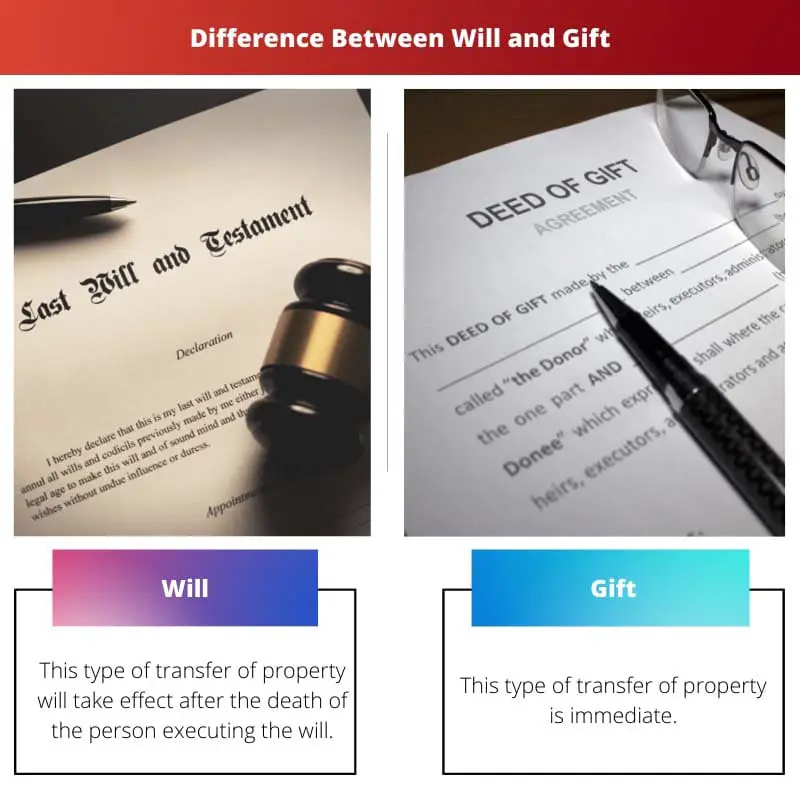A will is a legal document specifying how an individual’s assets are to be distributed after their death, whereas a gift is a voluntary transfer of assets or property from one person to another without any expectation of payment or compensation.
Key Takeaways
- A will is a legal document outlining how a person’s assets and property should be distributed after death. At the same time, a gift is the voluntary transfer of assets or property from one person to another without expecting payment or compensation.
- Wills are subject to probate and legal procedures after the testator’s death, whereas gifts can be given and received during a person’s lifetime.
- Wills can be contested or challenged in court, while gifts are irrevocable once given and accepted, barring instances of fraud or undue influence.
Will vs Gift
A will is a declaration of the testator’s intent to grant the beneficiary certain property rights that will become effective upon his or her passing. It may be challenged or canceled by a new will. While a gift is the transfer of wealth while the giver is still alive. A gift cannot be retracted.

There is no time lapse in availing of a gift deed—a person to help their share in the willing deed executed.
It needs to wait till the call of the legal authority. This process is time taking and encouraged solely by the confidant of the executor.
Comparison Table
| Feature | Will | Gift |
|---|---|---|
| Timing of Transfer | After death of the owner (Testator) | During the owner’s lifetime (Donor) |
| Revocability | Can be revoked or changed at any time before death | Generally irrevocable once executed |
| Formalities | Written document, witnesses required | Written document (Gift Deed), registration required for immovable property |
| Cost | Relatively inexpensive, depends on complexity | Can be expensive, particularly with registration and stamp duty for immovable property |
| Tax Implications | No immediate tax implications for beneficiaries | May be subject to gift tax, depending on recipient and value |
| Control over Assets | Owner maintains control over property until death | Recipient gains immediate ownership and control |
| Impact on Beneficiaries | Can ensure dependents are provided for | Allows owner to see recipient enjoy the gift |
| Potential Challenges | Will can be contested by heirs | Gift may be challenged under certain circumstances, e.g., undue influence |
What is Will?
Will, in the context of law and estate planning, refers to a legal document called a “last will and testament.” A will is a written document that outlines a person’s wishes regarding the distribution of their assets and the management of their affairs after their death. Here are some key points about a will:
- Asset Distribution: A will specifies how a person’s property, assets, and belongings should be distributed among their beneficiaries or heirs upon their death. This can include real estate, money, personal possessions, and more.
- Executor: A will names an executor, who is responsible for carrying out the deceased person’s wishes as outlined in the will. The executor is responsible for managing the estate, paying debts, and distributing assets to beneficiaries.
- Guardianship: Parents with minor children can use a will to designate a guardian who will take care of their children in the event of their death.
- Funeral and Burial Wishes: Some wills may include instructions for the deceased person’s funeral or burial arrangements.
- Contingency Plans: Wills can also include contingency plans, such as what should happen if a beneficiary predeceases the person making the will.
- Validity: To be legally valid, a will must meet certain legal requirements, which can vary by jurisdiction. These requirements include the need for witnesses to sign the will.
- Revocable: A will is revocable during the person’s lifetime, meaning they can change or update it as their circumstances or wishes change.

What is Gift?
A gift is a voluntary and tangible item or gesture given to someone without the expectation of receiving something in return. Gifts are given to express love, appreciation, gratitude, celebration, or to mark special occasions like birthdays, weddings, holidays, or other significant life events.
Gifts can vary widely in form and value, ranging from simple and inexpensive items to elaborate and expensive ones. Giving and receiving gifts is a common social practice that helps strengthen relationships and show thoughtfulness and care for others.

Main Differences Between Will and Gift
Will:
- A will is a legal document that outlines a person’s wishes regarding the distribution of their assets and property after their death.
- It takes effect upon the death of the person who created it (the testator).
- A will can specify how the testator’s property and assets should be distributed among beneficiaries.
- It can also appoint guardians for minor children and name an executor to carry out the instructions of the will.
- Wills can be revised or revoked during the testator’s lifetime, as long as they have the mental capacity to do so.
- A will goes through the probate process, which involves a court validating the will and overseeing the distribution of assets.
Gift:
- A gift is a voluntary transfer of property, assets, or other tangible items from one person (the donor) to another (the recipient), without any expectation of receiving something in return.
- Gifts can be given during the donor’s lifetime or as part of an estate plan.
- Once a gift is given, it becomes the property of the recipient, and the donor cannot revoke or take it back (unless specific conditions are set).
- Gifts are not subject to the probate process and are not subject to inheritance taxes.
- A gift may be subject to gift tax if its value exceeds a certain threshold, but the tax liability falls on the donor.

Last Updated : 29 January, 2024

Chara Yadav holds MBA in Finance. Her goal is to simplify finance-related topics. She has worked in finance for about 25 years. She has held multiple finance and banking classes for business schools and communities. Read more at her bio page.

While the technical analysis of wills and gifts is important, the article could benefit from a more in-depth discussion of their ethical and moral implications in legal contexts.
I agree, the ethical considerations associated with wills and gifts warrant a more thorough exploration, adding further depth to the article.
While the legal aspects of wills and gifts are important, it’s also essential to consider the emotional and familial implications they may have. A thoughtful discussion.
Absolutely, the personal and emotional elements of such decisions are equally significant and should not be overlooked.
The clarity and precision in explaining the legal and practical implications of wills and gifts are commendable, making this article a valuable resource for anyone seeking such information.
Indeed, the lucid explanation of complex legal concepts is a testament to the article’s clarity and accessibility.
I agree, the article’s thorough elucidation of the subject matter ensures a comprehensive understanding for readers.
The detailed comparison table is quite insightful, providing a clear and structured breakdown of the key differences between wills and gifts. Well done.
Indeed, the comparison table effectively summarizes the distinctions in a concise and informative manner.
Absolutely, the article’s systematic presentation of differences makes it easier to grasp the complexities of wills and gifts.
The article successfully combines legal and personal perspectives to provide an all-encompassing view of wills and gifts, enriching the understanding of this complex subject matter.
Indeed, the holistic approach to discussing the legal and emotional aspects highlights the relevance and significance of this article.
The article’s insightful exploration of the multifaceted nature of wills and gifts offers readers a comprehensive and insightful perspective.
Excellent breakdown of the key differences between wills and gifts, very informative and helpful in understanding their legal implications and processes.
Yes, the clear comparison table and explanation of each aspect provide a comprehensive understanding of the legal and practical differences between the two.
This article provides a comprehensive understanding of the legal and practical nuances of wills and gifts, making it a valuable resource for those seeking clarity on the subject.
Absolutely, the article’s detailed and multifaceted analysis offers readers an in-depth understanding of the complexities associated with wills and gifts.
The article’s clear delineation of the legal and practical distinctions between wills and gifts is commendable, providing valuable insights into their respective implications.
Absolutely, the article’s thorough analysis contributes to a deeper understanding of the legal and emotional aspects involved.
The comprehensive coverage of various dimensions related to wills and gifts makes this article a highly informative and enlightening read.
The thorough exploration of the legal and emotional dimensions of wills and gifts makes this article an insightful and enlightening read, providing valuable insights for readers.
Indeed, the article’s meticulous analysis and clear presentation enhance the understanding of wills and gifts, making it a highly engaging and informative piece.
This article provides a detailed and nuanced look at the differences between wills and gifts, shedding light on their respective legal, financial, and personal dimensions.
Agreed, the multifaceted nature of wills and gifts requires a thorough exploration that this article delivers admirably.
The inclusion of information about the emotional and familial aspects of wills and gifts adds depth and relevance to this discussion.